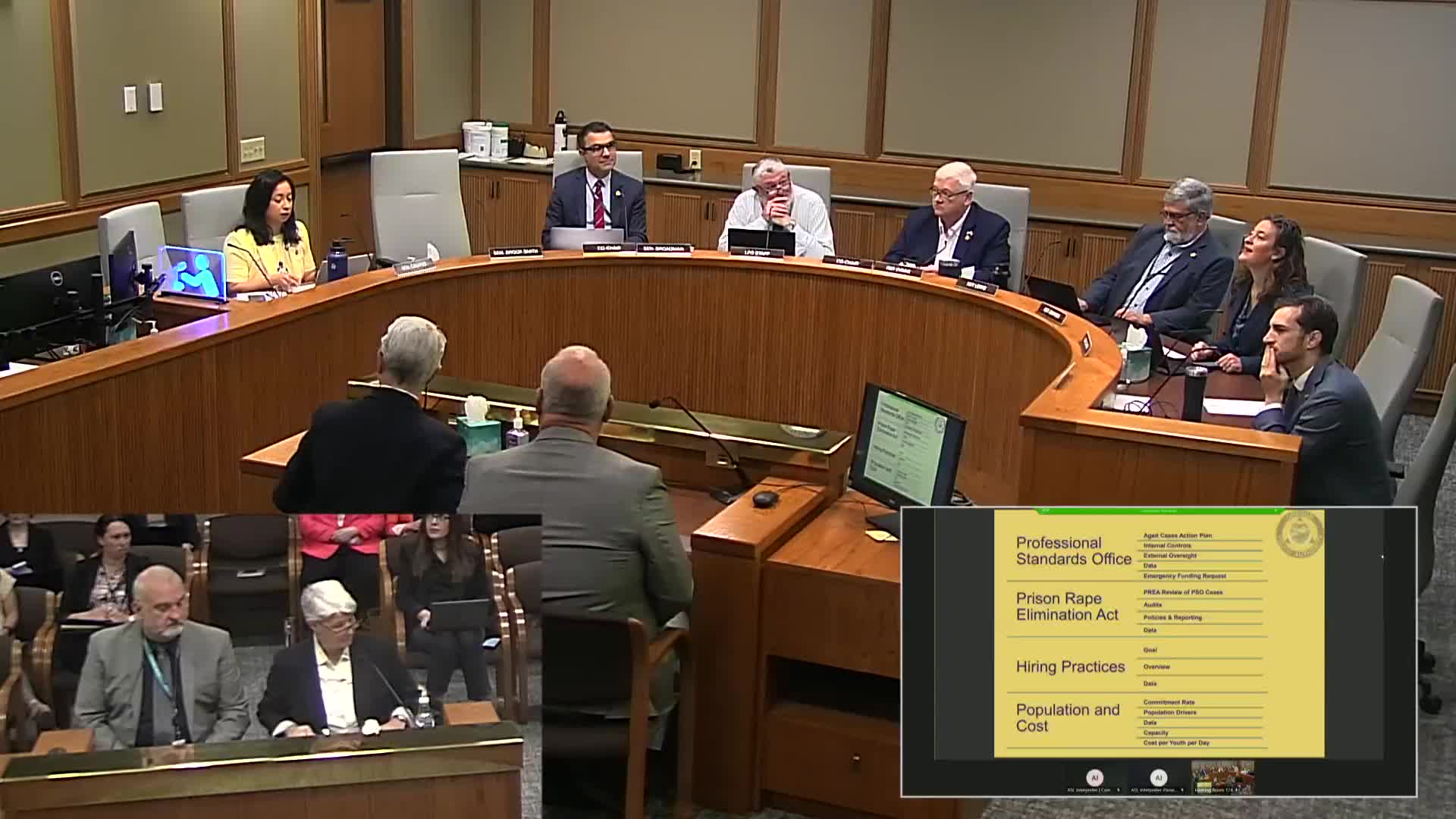Oregon Youth Authority outlines progress on investigation backlog, asks Legislature for $2.4 million and six PSO positions
Get AI-powered insights, summaries, and transcripts
Subscribe
Summary
At a May 1 Public Safety Subcommittee hearing, Oregon Youth Authority Interim Director Jana McClellan and interim PSO Chief Investigator Ken Jeske described steps to address an investigation backlog in the agency's Professional Standards Office, and requested emergency funding for six positions totaling $2.4 million in the next biennium.
Interim Oregon Youth Authority Director Jana McClellan told the Public Safety Subcommittee on May 1 that the agency's Professional Standards Office (PSO) has stabilized leadership, improved case tracking, and prioritized "aged" investigations opened more than 180 days ago, while asking the Legislature for emergency funding for six positions valued at $2,400,000 for the next biennium.
McClellan said PSO "can now easily show the work it is doing and the outstanding work left to be done on aged cases," and described steps taken since she assumed leadership of the effort in February, including hiring temporary investigators, standardizing weekly case-status reports and assigning aged cases to investigative teams.
The update matters because the agency reported 508 known aged cases as of April 25, down from earlier counts the director cited in February, and because many of those cases remain open pending additional investigative work or partner-agency disposition. McClellan told the committee the agency has closed roughly 250 aged and recent cases since Feb. 14 and that a larger set of cases remains to be signed off by the PSO chief investigator.
PSO improvements and staffing
Ken Jeske, interim PSO chief investigator, described operational fixes behind the update. He said the office now runs real-time reports differentiating cases by age and status, has assigned teams to aged cases, and is holding regular coordination meetings with partner agencies including the Oregon State Police and the Department of Human Services to resolve suspended cases. Jeske also told legislators that the PSO uses two timelines for investigations: hotline-level complaints typically have a 30-day target, and full investigations a 60-day target, though cases may be suspended while law enforcement conducts parallel inquiries.
The agency asked the Legislature to fund six positions: three investigators (two limited-duration to clear aged cases and one permanent screener), a deputy chief investigator, an HR analyst, and an unspecified sixth role. McClellan said the requested six positions total $2,400,000 for the next biennium and that the governor's office has supported the request.
Technology, oversight and workplace expectations
McClellan and Jeske described an older administrative investigative management system (AIM) that hindered oversight because reports had not been produced routinely; staff have been working to extract data and build weekly dashboards. The OYA also expects PSO investigators to be present in offices and facilities more frequently to support supervision and relationship-building; McClellan said investigators currently are required to be in the office about three days per week and to be present in facilities for certain investigative work.
Committee members pressed the agency on how cases are prioritized. Jeske said investigators have flagged cases for severity and that the office is implementing data fields that allow reports to identify cases with documentation gaps, lower-level recordkeeping problems and cases that may indicate significant failures with potential for youth harm. McClellan said some suspended cases reflect partner-agency jurisdiction (for example, Oregon State Police investigations) and that those cases remain in suspended status until partners complete their work.
External oversight and next steps
McClellan told the committee the agency has reestablished monthly meetings between PSO leadership and investigative partners and has scheduled quarterly meetings between the PSO chief investigator and the governor's office. She said the agency has created a Safety Task Force, to be co-led by a newly appointed youth and family advocate who reports to the governor, and that the Secretary of State plans a youth-safety audit in 2025.
The PSO funding request and the described operational changes do not include any formal legislative action during the hearing; lawmakers signaled interest and asked follow-up questions. McClellan and Jeske said additional work remains to set explicit closure-rate targets informed by the newly available data.
Ending
Committee members indicated they will consider the funding request and follow the agency's ongoing reporting. McClellan said the agency will provide regular updates to the safety task force and the committee as it implements staffing, tracking and oversight changes.
